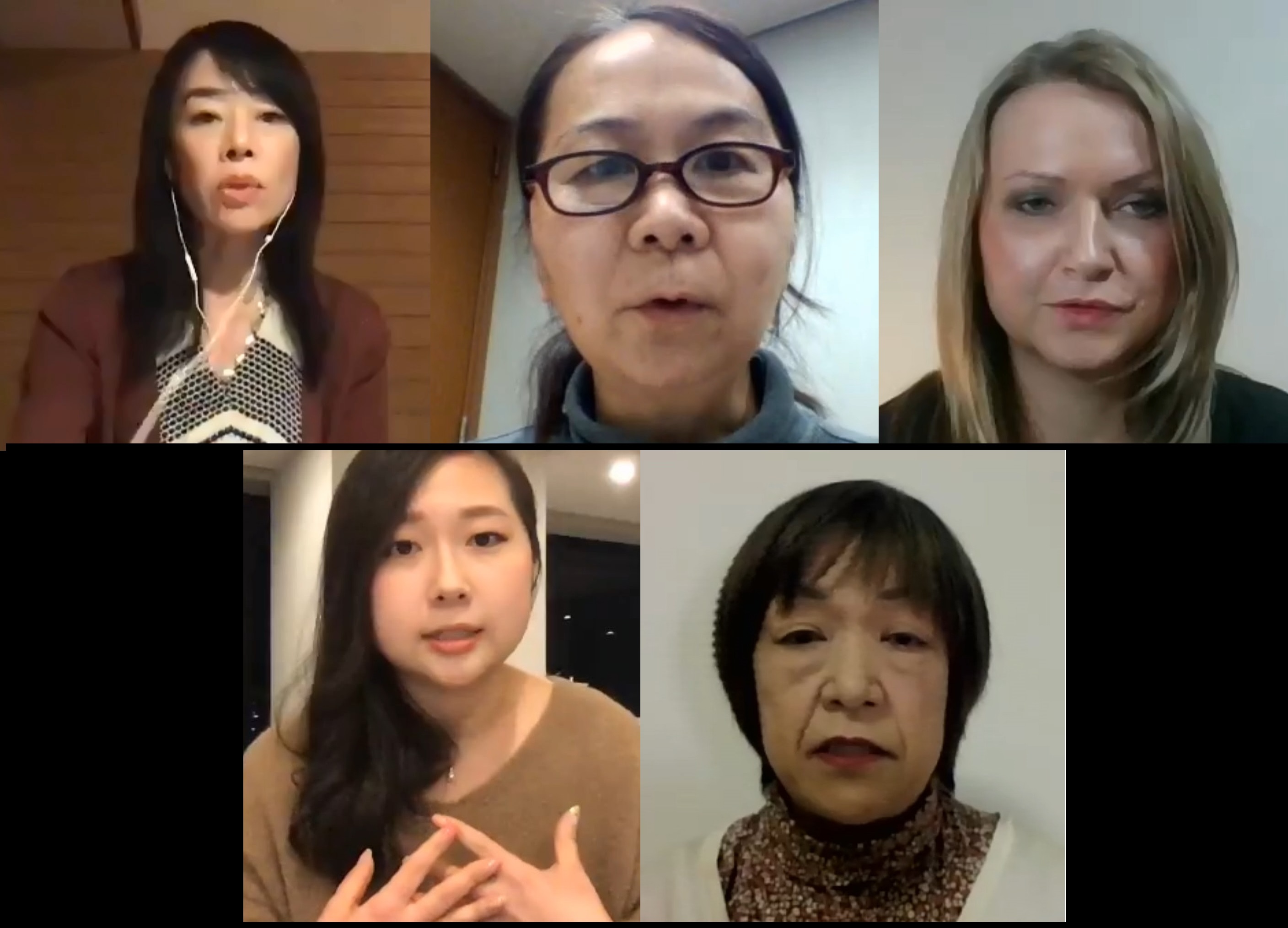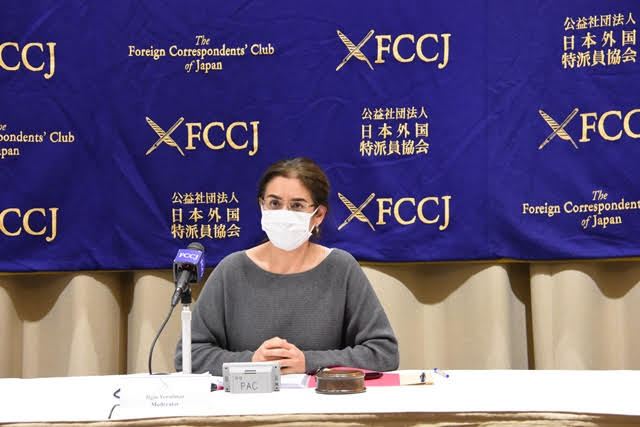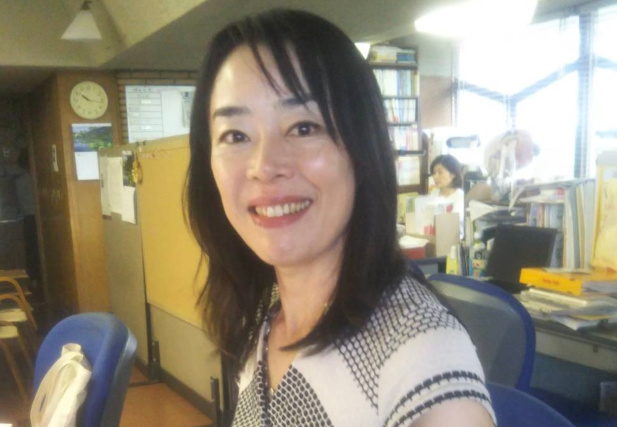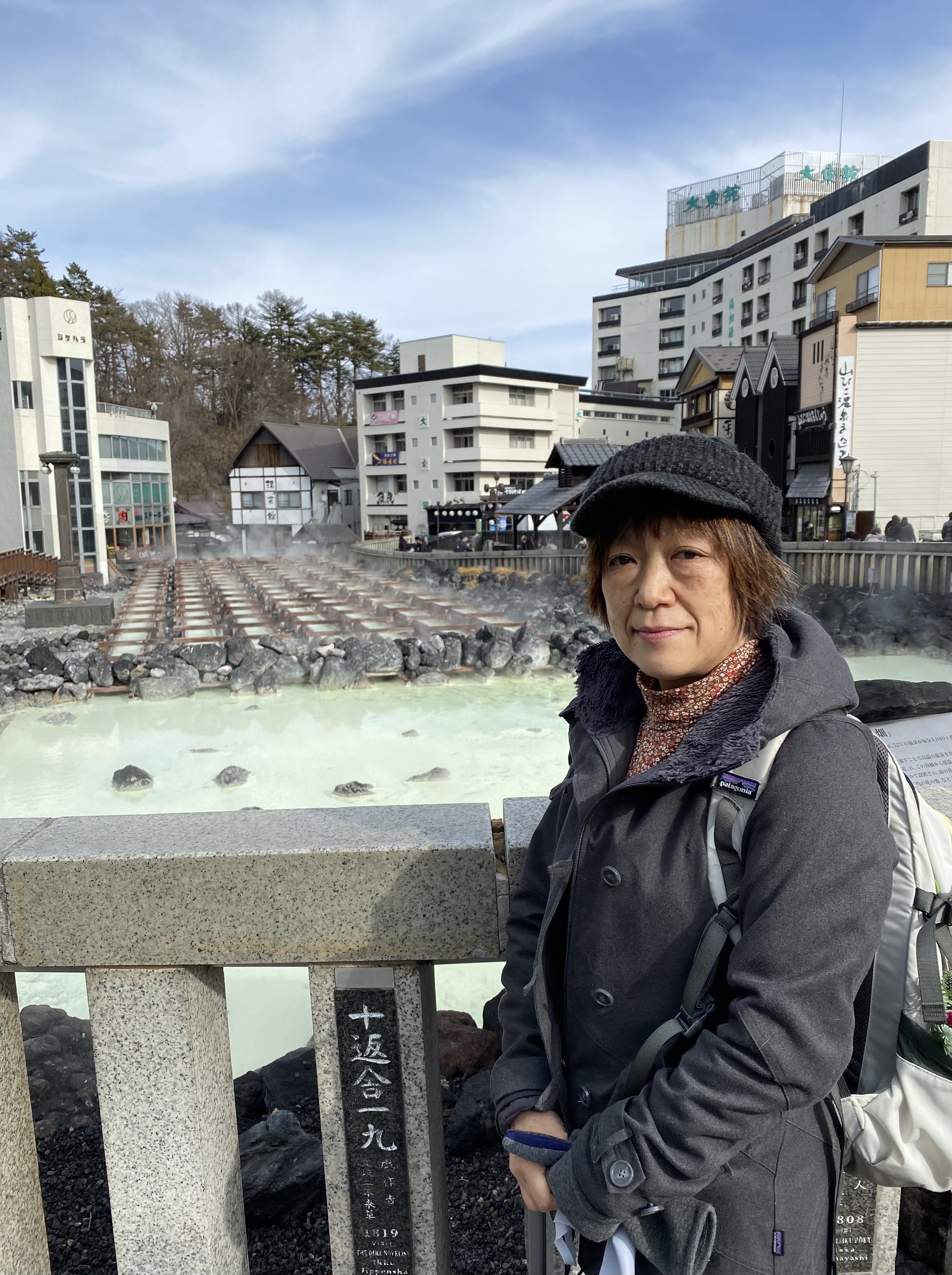Issue:
THE STRUGGLE FOR EQUALITY IN THE NEWSROOM IS A REFLECTION OF JAPAN’S WIDER GENDER PROBLEM

Panelists take part in a women in Japanese media event held at the FCCJ in January
ILGIN YORULMAZ
One of Japan’s first notable female journalists was Motoko Hani, the co-founder of the country’s oldest women’s magazine, Fujin no Tomo (Women’s Friend), 118 years ago. The publication was launched at a time when women’s lives were dictated by customs and traditions, and very few had connections outside their homes.
The monthly magazine is still going strong, and is now edited by Hani’s grandniece, Yoko Hani, who told a recent FCCJ event that, despite the passage of time, gender roles in Japan remain largely unchanged – including in the media.
Hani, one of five female journalists working on the frontline of the media who appeared at the Club in January, warned that a lack of diversity in media not only adversely affects the content, distribution and perception of news, it also makes it harder for women to break through into managerial ranks and effect much-needed change in both the local and national media.
The statistics support their concerns. Japan came 121st out of 153 nations in in the World Economic Forum’s 2020 gender gap index – its lowest ranking ever.
Few sectors reflect that male dominance of the economy and society more than Japan’s media. According to Japan Media Culture Information Group’s 2020 survey, women fill less than 10% of management roles in Japanese print and broadcast companies. And of 10 markets recently analyzed by the Reuters Institute, Japan stood alone in having no female senior news editors, despite a steady increase in the number of women working in journalism.
 |
|
Left: Ilgin Yorulmaz emcees a women in Japanese media event at the FCCJ in January Right: Yoko Hani, editor-in-chief of Fujin no Tomo (Women’s Friend) magazine |
|
Hani, who has years of experience as a reporter and editor, acknowledged that Japan had made progress since the days when her great-aunt ran stories on managing household finances and heavy-drinking husbands, but added that gender roles inside the home had not fundamentally changed.
“Many [Japanese] women think political news belongs to men,” said Hani, a former political reporter, adding that many women struggled to make the link between their everyday lives and the decisions made in the lower house of the Diet, where just 9.9% of lawmakers are women, according to the Inter-Parliamentary Union.
Hiroko Aihara, a former reporter for Fukushima Minyu Shimbun and now a freelance journalist, recalls learning an early lesson about society’s expectations for girls and women when she was growing up in Fukushima in the late 1960s.
“Girls from my junior high school and I were trying to negotiate with our male teachers on everything from wearing white socks to playing in the school boys-only soccer team,” she said.
“This was my first battle with gender issues,” she added, noting that one of those girls was Asako Takakura, who went on to play for the Japan national team and is now its manager.
Without a clear program to help women gain a footing in journalism and rise through the ranks, female journalists find it hard to obtain the experience they need to compete for editorial and managerial roles, she said.
Aihara recalled her male editors’ attitude when she told them she was interested in becoming a Fulbright fellow. None of them appeared to grasp how important it would be for her career, she said.
“I had to plead with my editor to allow me to do the fellowship,” she said. “He kept asking ‘What is Fulbright? What kind of change will it make in your life anyway?’” After getting a job at a local newspaper, she and other female writers discovered they were paid less than male journalists doing equivalent jobs.
Magdalena Osumi, a Polish journalist who has worked for the Japan Times for seven years, considers herself “a minority within a minority” as a foreign female journalist.
“Women are not taken seriously,” said Osumi, who writes about social and legal issues. “And that includes female journalists.”
When writing articles, Osumi finds that she invariably ends up having to talk to male experts due to the dearth of women commenters, a common problem that inevitably skews reporting towards a male outlook.
Video journalist Grace Lee, who covers Asia for a diverse, international audience, agrees that the sense among women journalists that they are not as trusted as their male counterparts can affect their self-confidence.
“A lot of young women start off with a imposter syndrome, thinking that maybe they’re not the right person to tell this story, or they don’t have enough authority to do this,” said Lee, a Korean-Canadian who reports on Japan for outlets such as CBS in Canada and NPR in the US. By contrast, she said, many of their less qualified male counterparts did not seem to have any self-confidence issues. “Just keep your head up,” she said.
|
|
| Yoshiko Hayashi, freelance journalist and co-founder of Women in Media Network Japan, during a visit to Kusatsu, a hot spring resort whose mayor has been accused of sexually assaulting a female assembly member. |
Although relatively new to Japan, Lee said most of the people put forward for her to interview are men, even when she is covering gender-related issues, even for a report on non-regular workers hit hard by the coronavirus pandemic, most of whom are women.
“Having grown up in South Korea, I recognize and sympathize with the kind of environment that girls here grow up with from a young age,” she said.
While female journalists are overlooked in one sense, in another they receive more scrutiny than men, according to Osumi, “especially when we cover issues that are more controversial and don’t please a large audience.”
Her encounter with Foreign Minister Toshimitsu Motegi last September, when he appeared to question her Japanese-language ability in response to a question about immigration policy, invited accusations of sexism. “We are attacked more on social media because we are women, and I think that happens quite often to many women managers,” Osumi said.
The discussion inevitably turned to sexual harassment in the workplace.
A 2018 survey by Prof. Mayumi Taniguchi, a gender studies expert at Osaka International University, found that women working for Japanese newspapers and TV networks had been sexually harassed – many repeatedly – with government officials, police officers and MPs cited as the perpetrators in about a third of the cases.
The poll, which uncovered 150 cases of alleged sexual harassment targeting 35 women, was carried out soon after Junichi Fukuda, then the most senior bureaucrat in the finance ministry, resigned over claims that he had made sexually inappropriate comments towards a female journalist. Fukuda’s then boss, the finance minister, Taro Aso, later blamed the victim, earning him an award for the year’s most sexist remark.
“Aso made very hostile remarks about Japanese reporters, and we couldn’t let this incident go,” said Yoshiko Hayashi – co-founder in 2018 of Women in Media Network (WiMN Japan), a diversity and safety advocacy group for female journalists in the Japanese media that now has 100 members.
Hayashi, who spent 30 years at the Asahi Shimbun before resigning in 2016, said she was inspired to help launch the group by the Fukuda case and the lack of remorse shown by Aso and other men in positions of power
After the Fukuda incident, WiMN Japan published a white paper, Mass Communication and Sexual Harassment in Japanese Media, which documented episodes of systemic harassment against female reporters.
“I don’t think the current Japanese government is enthusiastic when talking about gender equality,” Hayashi said. “They just want women to contribute to the economy because the population is declining.”
Despite the many challenges, women in the media are beginning to make their presence felt. Miwa Higashimuki of Reporters Without Borders said the organisation had recently joined hands with a group of concerned journalists to create the first Charter for Gender Equality in Japan’s Media Industry.
And in April last year, the Asahi Shimbun became the first Japanese media organisation to announce a Gender Equality Declaration.
The Asahi said it would “seek to at least double the number of women in managerial positions, who currently hold about 12 percent of such posts. We will also seek to improve the ratio of male employees who take paternity leave. We will also review the work style of all employees and make efforts to foster personnel so that everyone, regardless of gender, can be active workers while also caring for their children and aged relatives”.
● Ilgin Yorulmaz is a reporter for BBC World Turkish. She is secretary of the current FCCJ Board and co-chairs the Diversity Committee.
Photograph ©FCCJ, YOKO HANI and YOSHIKO HAYASHI



